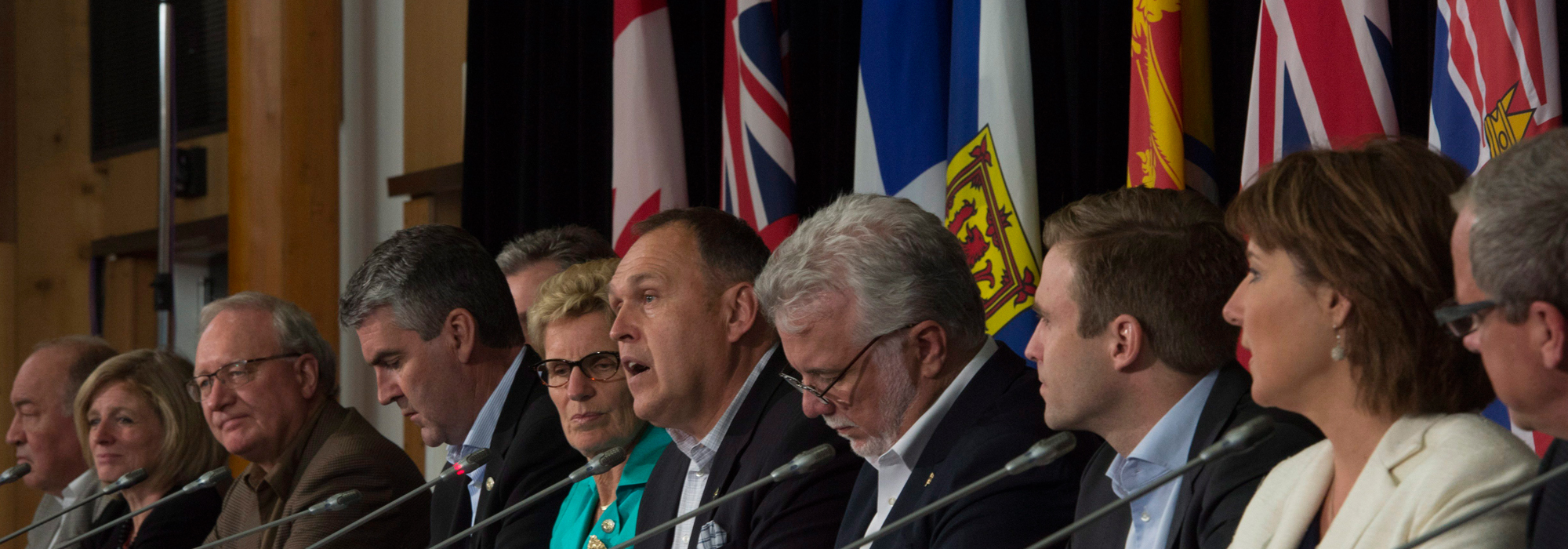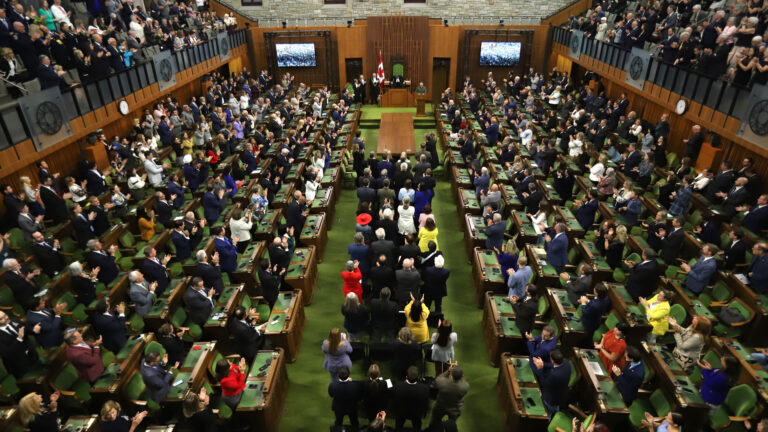Last week, at the annual meeting of the Council of the Federation, the premiers expressed their opposition to Ottawa’s position on health care funding and to having a national carbon tax imposed on them. The premiers are right; the federal government’s stated positions on both issues would return us to the bad old days, often associated with the current prime minister’s father, Pierre Trudeau, of “national policy” being made by the federal government acting unilaterally.
On health care, targeted federal funding for “boutique” programs is not a solution to the problem of inadequate federal support for provincial and territorial medicare systems. Let us remember first that, as health care is an area of provincial jurisdiction, what we have in Canada is 13 medicare systems, under provincial and territorial legislative authority, coordinated through a common framework of minimum requirements contained in the Canada Health Act. This framework is implemented through federal funding of health transfers to the provinces and territories. As such, Quebec Premier Philippe Couillard was absolutely correct when he told reporters, “We always have to remind our federal partners that provinces have the jurisdiction. We know what to do…We need the means to do it better.”
The federal government is no more than a partner with provinces and territories in making national policy. A previous federal Liberal government recognized this and signed the Social Union Framework Agreement with the provinces and territories in 1999. For those who have forgotten the details of this oft-maligned agreement, it committed governments to the principle of ensuring “adequate, affordable, stable, and sustainable funding for social programs” and asserted that “when the federal government uses…conditional transfers…it should proceed in a cooperative manner that is respectful of the provincial and territorial governments and their priorities.” It also committed the federal government to “consult with provincial and territorial governments at least one year prior to renewal or significant funding changes in existing social transfers to provinces/territories.”
The Quebec government is also right to oppose targeted funding for boutique health care programs. As Premier Couillard’s health and finance ministers stated in a letter to the federal government last month, targeted funding doesn’t always align with the priorities of the provinces. “History has taught us that when targeted funds run out, the provinces must solely take up responsibility for the expenses related to the new initiatives, which only further increases the financial pressures bearing upon them,” the ministers wrote.
This is all too true; targeted federal funds for new, boutique programs generally run out at exactly the same time as the federal government loses its ability to gain credit with the voters for introducing the new dollars. When the federal funds run out, though, demand for the new publicly funded service from those in need does not come to an end. Instead, the provincial and territorial governments are left with costly new demands for services.
If the federal government wants medicare systems to cover new services, it should negotiate with the provinces and territories to expand the scope of medicare to cover those new services. Part of any such negotiation must be a federal commitment to provide adequate, long-term, stable fiscal transfers to provinces and territories. This will allow them to provide new services under their medicare plans without causing their deficits to balloon. Frankly, the federal government’s only real, sustainable choices are to provide adequate transfers on a long-term basis or to permanently transfer more tax room to the provinces and territories. If the federal government wants to promote innovation in the health care systems of provinces and territories, by all means have the policy discussion with them along with the financing discussion.
I also agree with the premiers that a federal contribution of 25 percent of the cost of health care should be the minimum federal contribution to assist provinces and territories in meeting their health care costs. Further, the federal transfer formula should take into account factors that affect health care costs, such as the demographic differences between different provinces and territories. These issues would be part of the intergovernmental discussions.
The Prime Minister’s musings about creating a national carbon tax in order to meet Canada’s climate change commitments are equally disrespectful of the federal nature of our country. Yes, we have to act to address climate change as a country, but, as with health care, national policy solutions are not the same as federal government policies. The federal government is a partner in national policy-making with the provinces and territories, not their master. It isn’t the federal government’s place to impose a one-size-fits-all program approach on the provinces and territories.
The federal government is a partner in national policy-making with the provinces and territories, not their master.
Again, the Social Union Framework Agreement set out a principle of federalism and an approach to national decision-making in a federal state that would be as valuable in developing a national climate change strategy as in developing national social policy. That agreement states that “the Government of Canada will work collaboratively with all provincial and territorial governments to identify Canada-wide priorities and objectives…Each provincial and territorial government will determine the detailed program design and mix best suited to its own needs and circumstances to meet the agreed objectives.”
The starting point for a national climate change strategy built on this principle would be to set our greenhouse gas emissions reduction targets. Some in the scientific community have already estimated how much greenhouse gas emissions in Canada would need to be reduced for Canada to contribute to limiting global temperature increases to “well below” 2 degrees over pre-industrial levels and, ideally, 1.5 degrees. Canada has already committed to a target of reducing greenhouse gas emissions to 30 percent less than 2005 levels by 2030.
Those national greenhouse gas reduction targets could be divided up to create provincial/territorial targets. There should be a correlation between those targets and the amount of greenhouse gases emitted in each province and territory. If governments were to apply the principles of the Social Union Framework to developing a climate change strategy, once provincial/territorial greenhouse gas reduction targets were set, all governments would commit to regular reporting on their progress in achieving their targets, but the particular strategies used by each province and territory to meet its target would be up to its government.
It may be useful to have a federal carbon tax in place as a backstop or an incentive to encourage provinces and territories to make a serious effort.
This is not to suggest that there is no place for a federal carbon tax. It may be useful to have such a tax in place as a backstop or an incentive to encourage provinces and territories to make a serious effort to meet their emissions reduction targets rather than simply being free riders on the efforts of other jurisdictions. But all a federal carbon tax should be a backstop; taxpayers in provinces and territories that have strategies to help Canada meet its greenhouse gas emissions targets should be exempt from the federal carbon tax. In this way, the objectives of a national climate change strategy could be met, but each province and territory would be allowed to determine “the detailed program design and mix best suited to its own needs and circumstances to meet the agreed objectives.” This approach would be good federalism, as well as good national policy in a federal state.
As the premiers indicated last week, unilateral federal government action is not good federalism, nor does it make for good national policy. Not respecting the federal nature of our country and acting unilaterally instead contributed to the constitutional and existential crises that Canada had to endure under previous federal governments, notably those of Pierre Trudeau and Jean Chrétien. Unless Justin Trudeau also wants a constitutional and existential crisis to be a part of his legacy as prime minister, he should heed the messages of the premiers at last week’s Council of the Federation meeting and have a serious discussion with them about both the substance of good national policies in a federal state and the process for making them.
Photo: Canada’s Premiers are seen during the closing news conference following a meeting of Premiers in Whitehorse, Yukon, Friday, July, 22, 2016. The Canadian Press/Jonathan Hayward
Do you have something to say about the article you just read? Be part of the Policy Options discussion, and send in your own submission. Here is a link on how to do it. | Souhaitez-vous réagir à cet article ? Joignez-vous aux débats d’Options politiques et soumettez-nous votre texte en suivant ces directives.











